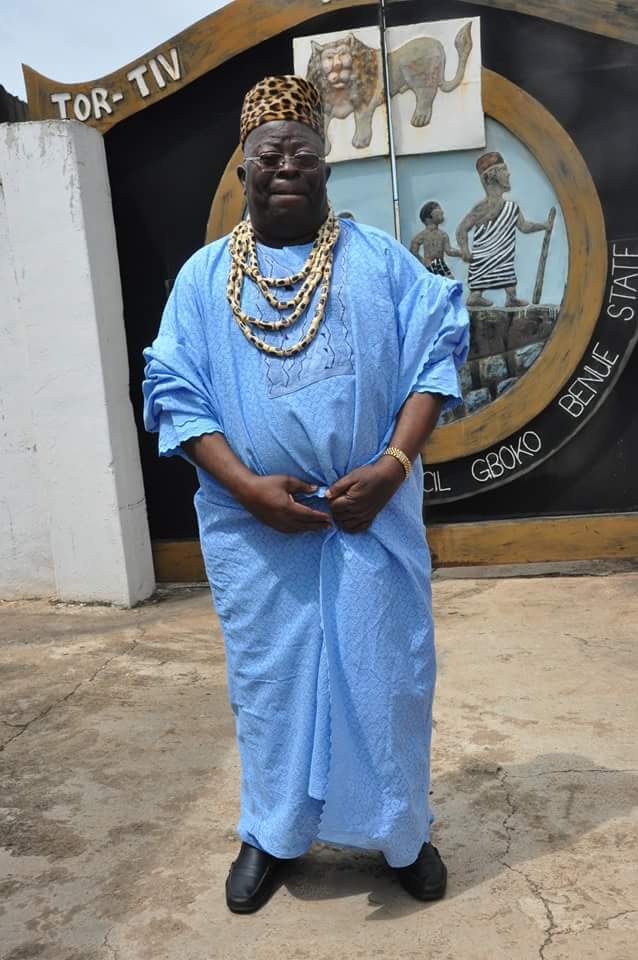His Royal Majesty, Begha U Tiv, Orchivirigh Dr. Alfred Akawe Torkula (1944–2015)
Orchivirigh Dr. Alfred Akawe Torkula (10 July 1944 – 22 November 2015) was the fourth Tor Tiv, the paramount ruler of the Tiv people and Chairman of the Benue State Council of Traditional Rulers. He reigned from 14 January 1991 until his death in 2015. A native of Ihyarev, son of Ichongo, he was the second Tor Tiv from the Ichongo lineage, ascending the throne through the rotational principle (ya na angbian) between the descendants of Ichongu and Ipusu.
Torkula was also an academic, a seasoned civil servant, a cultural custodian, and a university chancellor.
Early Life and Education
Alfred Torkula was born in Tse-Torkula, Mbadwem District, Guma LGA, Benue State, Nigeria. He began his education at Tiv N.A. Elementary School, Gboko (1953–1958) and continued at St. Theresa’s Catholic Primary School, Naka in 1959. He attended Mt. Saint Michael's Secondary School, Aliade (1960–1964), and later Kings College, Lagos.
He proceeded to Ahmadu Bello University, Zaria, and later earned a B.A. (Hons) and DEFE in French from the University of Besancon, France, in 1971.
Career and Positions
Torkula began his civil service career in the Benue-Plateau State Civil Service, later continuing in Benue State after its creation in 1976. He rose through the ranks, becoming a Permanent Secretary and Director-General. In April 1989, he was appointed Commissioner for Local Government Affairs under Colonel Fidelis Makka’s administration.
He was crowned Tor Tiv IV in January 1991, becoming the spiritual and cultural leader of the Tiv people and Chairman of the Benue State Council of Traditional Rulers, a position he held until his death.
Academic Achievements and Honours
- Earned a Ph.D. in Cultural Anthropology.
- Awarded honorary LL.D (University of Ibadan) and D.Sc (Michael Okpara University of Agriculture, Umudike).
- Served as Chancellor of:
- University of Ibadan (1994–2001)
- University of Calabar
- Michael Okpara University of Agriculture, Umudike (until his death)
- Recipient of the Commander of the Federal Republic (CFR), a national honor.
Reign as Tor Tiv
At his coronation, the Tiv nation faced internal unrest and external conflicts such as the Jukun-Tiv crisis in Taraba State and boundary disputes within Benue. Torkula prioritized unity, peace, and reconciliation, warning and disciplining local leaders who incited conflict.
Key Contributions:
Established chieftaincy titles to promote unity and recognize contributions across political, ethnic, and religious lines.
- Conferred the Zege Mule U Tiv (Great Shade of the Tiv) on Aliyu Mohammed and Atiku Abubakar.
- Bestowed Asor-Tar-U-Tiv (Healer of Tivland) on Martin Dent, a British colonial officer.
Cultural Advocacy:
- Authored books such as:
- Death and Burial Customs of the Tiv People of Central Nigeria
- The Cosmology in Tiv Worldview
- The Tiv Woman: Challenges and Prospects
- Presidential Democracy in Nigeria: Grassroots Experience
- The Culture of Partisan Politics in Nigeria: A Historical Perspective
- Authored books such as:
Opposed societal deviations from Tiv traditions:
- Fought against exorbitant bride prices
- Banned exploitative burial practices and unjust fundraising norms
- Promoted respect for elders and cultural moderation
Institutional Reforms:
- Expanded the Tiv Traditional Council by:
- Creating 14 second class stools
- Proposing 6 first class stools
- Introducing 60 third class chiefdoms
- Expanded the Tiv Traditional Council by:
Cultural Identity:
- Promoted traditional Tiv attire by rejecting northern-style turbans.
- Wore leopard skin caps and traditional beads, affirming the Bantu heritage of the Tiv.
Advocated for Legislative Reform:
- Called for greater autonomy of the traditional institution and protection from political interference.
Legacy
Dr. Torkula was revered for his intellectual depth, cultural leadership, and commitment to peace. The Sultan of Sokoto, Dr. Abubakar Sa’ad II, described him as:
"An educationist who ensured that his people moved from the level of illiteracy to literacy; a businessman who created avenues for incomes for many of his subjects."
References
Additional information and references can be obtained from official state publications, university records, and cultural archives.
